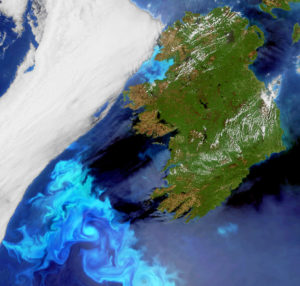
On 19 June 2019 at the DCU Alpha Campus in Glasnevin, the Minister of State for Training, Skills, Innovation, Research and Development, John Halligan TD, launched Ireland’s first National Space Strategy for Enterprise 2019-2025.
The national strategy will provide strategic support to Ireland’s expanding space-active industry and research institutes, which work across a range of technological domains and develop technology with both space and non-space applications.
Launching the strategy, Minister Halligan said, “I am very proud to be launching Ireland’s first ever Space Strategy for Enterprise. I have personally championed this initiative because I see the great potential for Ireland to build a thriving space sector based on our technological strengths.”
“Space-active Irish companies have become increasingly successful within European Space Agency and EU programmes in recent years. As the space economy continues to evolve at an unprecedented rate, there is a growing opportunity for Irish companies to participate. This strategy puts into place a framework for a greater Irish involvement, and enhanced success at a global level.”
The development of this strategy is extremely timely as the international space sector is currently undergoing a rapid evolution. According to the European Investment Bank (2019), the international space sector has grown by an average of 6.7% per annum between 2005 and 2017, almost twice the 3.5 % average yearly growth of the global economy.
In parallel, the capabilities of space-active enterprises in Ireland have progressed significantly in recent years, with the number of companies engaged in contract work with the European Space Agency (ESA) having grown from 35 in 2008 to 67 in 2018. The development of Ireland’s space-active industry is supported by Ireland’s membership to international organisations including the ESA, the European Union space programmes and EUMETSAT.
Minister Halligan added, “The national space strategy also significantly supports the aims of the Future Jobs Ireland framework, embracing innovation and technological change and supporting the development of quality jobs that will be resilient into the future.”
“The skills and capabilities necessary to develop space technology are often transferable between the space sector and other high value sectors such as automotive, environmental protection, agriculture, maritime and human medicine. Irish enterprise is already competitive across a range of technological domains related to these sectors, including software development, manufacturing, photonics, engineering, nano-materials, data analytics and communications technologies, and is ideally placed to seize the new opportunities within the evolving space market and moreover, to transfer their skills and technology between the space and non-space markets.”
The strategy sets out six ambitious goals to achieve by 2025:
- double the space related revenue and employment in space-active Irish companies;
- support 100 companies to benefit from ESA engagement;
- double the value of contracts won through the EU Horizon programmes in space-related activities;
- increase industry, public and international awareness of space and Ireland’s activities in space;
- develop and attracting talent for space-active and related industries; and
- develop a sustainable Earth Observation services sector based on advanced data analytics capability.
The delivery of these goals is underpinned by a target to increase Ireland’s overall public and private investment through ESA. The strategy aims to increase public and private investment in ESA by 50% by 2025, which would see investment grow to an annual level of €32m.
Tom Kelly, Divisional Manager Innovation and Competitiveness at Enterprise Ireland said “Last year, 27 companies in Ireland secured European Space Agency contracts valued at €19.3m. Irish companies are at the leading edge of innovation and technological developments within the Space sector in a range of technology areas including development of the next-generation satellites and spacecraft, technologies for human spaceflight, as well as technologies to optimise the use of Earth observation, telecommunications and navigations satellites.”
The National Space Strategy for Enterprise 2019-2025 can be found at: National Space Strategy for Enterprise 2019 – 2025





